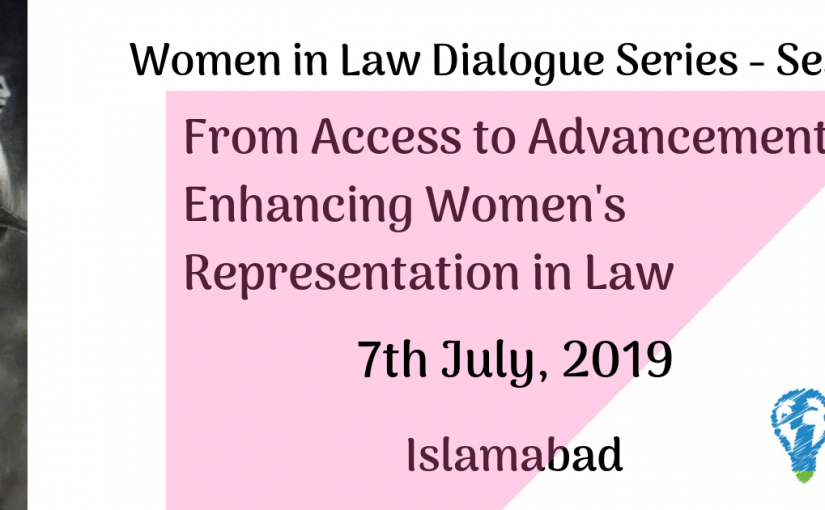
Press Release – Women in Law Islamabad Chapter Launch | 7th July 2019
The fifth session in the ‘women in law dialogue series’, titled ‘from access to advancement: enhancing women’s representation in law’ was conducted by Lahore Education and Research Network in Islamabad on 7th July 2019.
Women in law dialogue series was launched in Lahore in 2016 with the objective of highlighting the challenges and opportunities faced by female lawyers in the legal profession and to understand and address their barriers to progression in this field.
Whilst previous sessions laid the ground for access, equality, inclusion and diversity in the legal profession, session 5 was focused on advancement, progression and representation of women in the field.
“We launched the series in 2016 to provide a platform for female lawyers to come together to address their common challenges, however, since then, the series have grown into an initiative on its own and we felt that having talked about access and inclusion, it was important to address the glaring disparity in more representative positions within the profession that occur at a more advanced stage.” said Nida Usman Chaudhary, the founder of the initiative. “At present, only 5 out of 106 judges in various High Courts across the country are female, women hardly reach senior partner level positions in law firms and you seldom see them practice in areas such as criminal law which are considered hard.” she added.
Former Chairperson of Competition Commission of Pakistan and Founding Partner of Hassan, Kaunain and Nafees Advocate and Consultants, Ms. Rahat Kaunain was among the panelists. She encouraged female lawyers to see themselves as a ‘professional lawyer’ as opposed to their ‘gender’ because the more conscious you are of the fact that you are a woman, the more uncomfortable a male dominated place could make you feel. “There are three barriers to advancement in my view, you, your boss and your family” she added.
“There are three barriers to advancement in my view, you, your boss and your family” – Rahat Kaunain
Other panelists included advocates Benazir Jatoi, Amna Abbas, Minahil Khan and Huma Jamil Babar.
Advocate Benazir Jatoi highlighted that the “disparity is so high that any reform or change towards advancement has to come through policy and affirmative action.”
“disparity is so high that any reform or change towards advancement has to come through policy and affirmative action.” Benazir Jatoi
Advocate Huma Jamil Babar, who practices criminal law, an area which very few women pursue, explained the kind of physical and mental stress that comes with practicing in such a hard area. She felt, many women shy away from such fields because of the nature of such area of practice for which women in our society are not prepared socially. She however stressed that if you are good at what you do and are committed, you will fetch clients and you will progress.
During the round of open discussion, Jugnoo Kazmi, a lawyer working under the Supreme Court clerkship programme highlighted that prior to their demanding it, there was no bathroom at the Supreme Court Building which was for women. “The clerkship programme which caters to inclusiveness and attempts to hire equal number of male and female candidates in the programme has made a difference in the attitude of the staff in the Supreme Court as well who have now begun to accept us women in the workplace., therefore, affirmative action does help make the environment more conducive and inclusive for all” she added.
“There were no bathrooms for females in the Supreme Court building” – Jugnoo Kazmi
Secretary of Islamabad High Court Bar Association, Mr. Umair Baloch attended as a Guest of Honour. On behalf of Islamabad High Court Bar Association, Mr. Baloch welcomed the initiative to Islamabad and offered to support the cause in his own capacity wherever he could. He encouraged more women to come forward and practice and agreed that female lawyers had their unique set of challenges that should be addressed.
MNA Shandana Gulzar Khan graced the occasion as the Chief Guest. She shared her personal journey in law and identified that many issues that women face in this profession were not limited to the legal profession but that they were part of the bigger social challenges which need to be resolved. “The issues identified today need to be categorized as whether they are law and policy issues, institutional or structure issues or general social issues and only then can proper solutions and way forward towards their reforms could be brought” she added.
The women in law present culminated the session with a resolve to push for three policy level changes, (i) affirmative action for parity for greater representation at bench, bar & senior managerial level position, (ii) an enabling environment sensitive to needs of female lawyers, including day care facility, maternity benefit and leave and separate bathrooms etc and (iii) mentorship and training of young lawyers, particularly women.
The event was well attended by lawyers, practitioners, students and development experts from Islamabad, Rawalpindi and Attock Bar.The session further marked the launch of the Islamabad Chapter of the women in law initiative which will result in further sessions being organized in the capital under the initiative.

